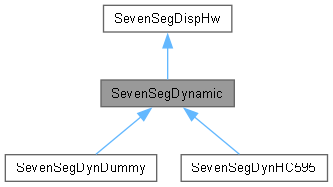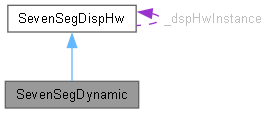Abstract class models a generic dynamically updated Seven Segment display hardware More...
#include <SevenSegDispHw.h>


Public Member Functions | |
| virtual bool | begin (uint32_t updtLps=0) |
| Sets up the hardware display to work. | |
| virtual bool | end () |
| Reverts the begin(uint32_t) actions, stopping the display activities, stopping and deleting the timer created for periodic refreshing and freeing the resources used by the Seven Segment display hardware object. | |
| Public Member Functions inherited from SevenSegDispHw | |
| SevenSegDispHw () | |
| Default class constructor. | |
| SevenSegDispHw (uint8_t *ioPins, uint8_t dspDigits=4, bool commAnode=true, uint8_t dspDigitsQtyMax=0) | |
| Class constructor. | |
| virtual | ~SevenSegDispHw () |
| Class destructor. | |
| virtual uint8_t | getBrghtnssLvl () |
| Returns the current display brightness level setting for the display. | |
| virtual uint8_t | getBrghtnssMaxLvl () |
| Returns the maximum display brightness level setting allowed for the display. | |
| virtual uint8_t | getBrghtnssMinLvl () |
| Returns the minimum display brightness level setting for the display. | |
| bool | getCommAnode () |
| Returns a value indicating if the display module component of the display hardware uses a common anode or a common cathode led wiring. | |
| uint8_t * | getDspBuffPtr () |
| Returns a pointer to the display buffer. | |
| uint8_t | getHwDspDigitsQty () |
| Returns the quantity of digits of the display module. | |
| virtual bool | getIsOn () |
| Returns the state of the display. | |
| uint8_t * | getxcdDspBuffPtr () |
| Returns a pointer to an array holding the contents for the digits/ports available from the display controller but not used for plain digits display. | |
| virtual void | ntfyUpdDsply () |
| Notifies the SevenSegDispHw component object of a change of content available in the display buffer, so that the object proceeds to update the display. | |
| virtual bool | setBrghtnssLvl (const uint8_t &newBrghtnssLvl) |
| Sets the brightness level for the display. | |
| virtual bool | setDigitsOrder (uint8_t *newOrderPtr) |
| Sets a mapping to relate the display buffer positions to the display port assigned to exhibit it's contents. | |
| void | setDspBuffPtr (uint8_t *newDspBuffPtr) |
| Sets the pointer to the Display Buffer memory area. | |
| virtual void | turnOff () |
| Turns the display module off. | |
| virtual void | turnOn () |
| Turns the display module on. | |
| virtual void | turnOn (const uint8_t &newBrghtnssLvl) |
| Turns the display module on set at the provided brightness level. | |
Additional Inherited Members | |
| Protected Attributes inherited from SevenSegDispHw | |
| uint8_t | _allLedsOff {} |
| Value to set in the display port to set all leds off (a "space"), dependent of _commAnode. | |
| uint8_t | _brghtnssLvl {0} |
| Current display brightness level. | |
| uint8_t | _brghtnssLvlMax {0} |
| Maximum display brightness level. | |
| uint8_t | _brghtnssLvlMin {0} |
| Minimum display brightness level. | |
| uint8_t * | _dspBlankBuffPtr {nullptr} |
| Pointer to a display buffer filled with _allLedsOff ("spaces") to use as display buffer while in "Off State". | |
| uint8_t * | _dspBuffPtr {nullptr} |
| Pointer to the display buffer, will be provided by the SevenSegDisplays object when it's instantiated. | |
| uint8_t * | _dspBuffPtrBkp {nullptr} |
| Pointer to the display buffer, copy of the original _dspBuffPtr to be used as backup. | |
| bool | _isOn {false} |
| Current display status: On/Off. | |
| uint8_t * | _xcdDspBuffPtr {nullptr} |
| A pointer to a buffer the size of the exceeding digits used to control display specific amenities. | |
| uint8_t | _xcdDspDigitsQty {} |
| Number of unused available display ports, its the difference (_dspDigitsQtyMax - _dspDigitsQty), being the size of the array pointed by _xcdDspBuffPtr. | |
Detailed Description
Abstract class models a generic dynamically updated Seven Segment display hardware
Member Function Documentation
◆ begin()
|
virtual |
Sets up the hardware display to work.
Depending on the display technology and the resources it needs to start working, this method takes care of those preparation. That means that each specific subclass of display will have to provide it's version of begin().
The SevenSegDynamic abstract class and it's subclasses model displays that need regular refreshing of its contents, and for this to happen their begin() method must implement and start timers and/or periodic interrupts to handle it's refreshing routines.
- Return values
-
true The specific configurations and startups could be successfully made
- Returns
- false One or more of the specific configurations or startups failed.
- Note
- For each SevenSegDynamic instantiable subclass a short description of their respective begin() actions will be added if they are relevant to the developer using the library.
Reimplemented from SevenSegDispHw.
Reimplemented in SevenSegDynDummy, and SevenSegDynHC595.
◆ end()
|
virtual |
Reverts the begin(uint32_t) actions, stopping the display activities, stopping and deleting the timer created for periodic refreshing and freeing the resources used by the Seven Segment display hardware object.
- Returns
- true The display activities could be stopped and resources freed with no problems.
- false The display activities couldn't be stopped. The method failed.
Reimplemented from SevenSegDispHw.
Reimplemented in SevenSegDynDummy, and SevenSegDynHC595.